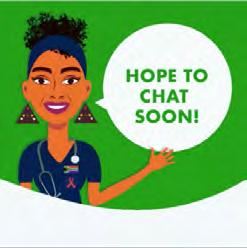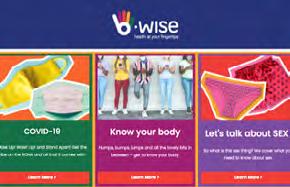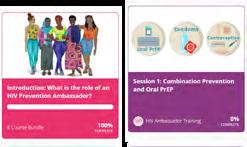
11 minute read
Accelerating Digital Innovation at Wits RHI
What is digital innovation and how can it be used in healthcare?
Digital innovation is the use of digital technology such as websites, chatbots, mobile apps and online training that can improve existing processes and can open new possibilities to treat and support communities remotely. It is important to utilize digital tools that can keep in touch with communities and link them to services in a safe and responsible way. With the expansion of mobile phones, smart phone applications, internet access and artificial intelligence, discovering new ways to engage communities in self-care is growing rapidly.
Advertisement
How did Wits RHI utilize digital innovation during the South African lockdown?
Wits RHI partners and stakeholders designed strategies that promoted the usage of existing digital tools and platforms during the South African Covid-19 lockdown.
The South African government implemented phases of lockdown which have impacted the health seeking behavior of youth, and programmatic data has confirmed a downward trend
Social Media How did social media provide ongoing support, entertainment and information during the lockdown?
People spend time on social media, searching for support, entertainment and information. Project PrEP continued to provide its followers with just that, and a whole lot more! The amount of boosted posts was increased 3 times more than usual to increase engagement and reach among its priority districts. During the level 5 lockdown period, @myPrEPSouthAfrica Facebook page reached almost 1 million people, received an in accessing HIV and SRH services. As people all over the world are striving to manage the COVID-19 crisis, they are looking towards digital innovations to inform, engage and support clients and communities. Many organizations, including Wits RHI, has turned to technology and social media among other methods to engage adolescent girls and young women and their communities whilst adapting to the new normal.
Many communities do not have access to the benefits of receiving information through technology or social media, especially the most vulnerable. It is therefore important to design and deliver digital technologies that can still provide health care support in a way that is user friendly, affordable and easily accessible while respecting the digital rights of all. Technology provided solutions to many questions from Wits RHI including: How can we control the spread of Covid-19? How do we continue providing PrEP and other SRH services? How can we prevent GBV? How do we continue training our
PrEP ambassadors? Since the lockdown, it was clear that people needed access to timely and reliable information. We shared mobile clinic and facility schedules that informed people about the services that were available during lockdown. Mental health, gender-based violence and other resources were shared to keep people, informed, motivated, linked to services available in their
communities, helplines and even a bit of entertainment.

average of 40 000 likes, shares and comments per month and received an average of 30-60 private messages per day.
Chatbot
How did Sister Unathi, the chatbot answer questions from the public during the lockdown?
Historically, the My PrEP website received approximately 6000 visitors per month and the influx of private messages received on the My PrEP Facebook page led us to developing and implementing Sister Unathi to help with responding to questions and messages. Sister Unathi is a chatbot that utilizes Artificial Intelligence technology allowing visitors the ability to instantly receive text answers to their frequently asked questions around PrEP and other sexual and reproductive health related services. The reporting solution is equipped with a high-level dashboard, enabling accurate reports on usage rates and demographic data and recording all conversations over time, enabling us to monitor and improve the way in which she answers questions.

Since implementation in April 2020, there was a total of 13 389 conversations and an overall 80% positive rating from users over this period. The questions asked during this period proved that people were interested in knowing more about PrEP and other SRH services during the lockdown. In addition, Sister Unathi was
also programmed and taught how to respond to COVID-19 questions, an add-on that the team facilitated during the early phase of hard lockdown. The chatbot will further be updated to include a broader range of topics and linkage to services and will also be implemented on the refreshed NDoH B-Wise website in October 2020.
What type of questions did people ask Sister Unathi? • What is PrEP? • Where can I get PrEP? • How does PrEP work? • How much does PrEP cost? • What are the side effects of PrEP? • I am HIV positive, can I use PrEP? • Where can I get family planning? • Where will the mobile clinic be today? • What are the symptoms of COVID-19 • Where can I test for COVID-19? • What can I do during the lockdown?


What role does the My PrEP journey mobile application play?
The development of the My PrEP journey mobile application was carried out in close collaboration with the South African National Department of Health and its partner implementing organizations, Unitaid, She Conquers SA, Wits RHI and the World Health Organization (WHO). The My PrEP journey mobile application was implemented in April 2020 to facilitate and support the continued use of Oral PrEP as a method of HIV prevention in selected priority districts. Since April 2020, 1073 Project PrEP users were registered on the app.
Due to the ongoing COVID-19 outbreak, it was decided that duplicating the existing app for a broader national rollout to PrEP users in South Africa would serve as an excellent source of additional support and linkage to services as well as to support the national roll out of PrEP countrywide, thus contributing positively to the goal of preventing HIV infection, genderbased violence and it empowers young people to access health services especially during the COVID-19 pandemic. The version for national rollout was supported by WHO and both version 1 and 2 of the mobile application is available for download from the Google Play Store and the App Store.
What are the functions of the My PrEP journey mobile application?

The mobile application is multi-pronged, PrEP initiators will be encouraged to download the app that will support and reward them on their PrEP journey, encourage continuation, provide PrEP pill taking reminders, build their knowledge in the form of quizzes and be used as a method of data collection allowing for remote monitoring, thus improving health outcomes. PrEP users can self-register and in a few minutes the app will be ready for use. It is only 15MB in size and does not require a lot of space on a mobile phone. The app only requires activity from users for about 5 minutes per day and does not include videos or images that will deplete mobile data. The best part is that it does not require periodic updates. Think of the app as a number one supporter to prevent HIV and stay motivated while on PrEP.
Bwisehealth.com reimagined through a stepped care model approach
How does the stepped care model aim to reduce the burden on the health care system? In late 2019 and early 2020, the National Department of Health conducted multiple stakeholder engagements to reimagine their B-Wise platform (www.bwisehealth.com). B-Wise is the official NDOH youth health platform.
The Wits RHI team sits on the B-Wise 2.0 steering committee formed at the conclusion of the stakeholder engagements, and has provided support in the redevelopment of the B-Wise website from strategy to implementation through technical support for content creation, brand strategy, chatbot development and marketing campaigns.
The aim of the stepped care model is to reduce burden on the health care system, by channeling young people in South Africa up and down the model as their needs require and offering multiple virtual points of service that may not need human clinical intervention, or towards clinical interventions where necessary.
Since re-launch in late August 2020, the Steerco is actively involved in continuing to improve the new B-Wise platform, and is continuously integrating innovations into the platform, in a collaborative approach with NDOH, Wits RHI, WHO, CHAI, AVAC and loveLife.
COVID-19 Health Check


Wits RHI has collaborated as a technical partner with the Praekelt Foundation and the National Department of Health (NDOH) to build an Unstructured Supplementary Service Data (USSD) and WhatsApp Digital Risk Assessment and Mapping Tool called COVID-19 HealthCheck. The NDOH WhatsApp platform that houses the HealthCheck tool has become the most highly utilized platform for users in the country and is currently serving millions of South Africans.
Why do we need this App?
This tool complements national screening efforts by allowing users to self-report their symptoms and details, such as age and location, for the early detection, mapping, and linkage of those people who report symptoms to testing services. The prompts on either platform ask users to complete a digital risk assessment in their local language of choice. Based on their responses, users will be informed whether they have a low, moderate, high, or critical risk of having COVID-19. The App then suggests actions to the user based on their risk. Once a user is on the system, weekly prompting messages is sent to encourage them to recheck their symptoms.
HealthCheck also creates a wide-reaching channel for the government to communicate directly with and to educate citizens as the pandemic evolves.
More Wits RHI digital innovations
MyPrEP decision support tool
Wits RHI has also been working, as part of the POWER team, on the development of a patient-facing decision support tool to promote PrEP uptake and use among young South African women. The tool was presented to the NDoH PrEP technical working group in September 2020 for exploration on how it can be incorporated into the NDoH suite of digital innovations.
CHARISMA goes mobile
The Community Health clinic model for Agency in Relationships and Safer Microbicide Adherence (CHARISMA) is an intervention designed to address the ways gender norms and power differentials within relationships affect women’s ability to safely and consistently use PrEP. Evidence-based interventions, such as CHARISMA, that identify and address IPV and other relationship dynamic barriers to PrEP use for women are critically needed. Wits RHI has been invited as a technical assistance partner, to offer guidance and support on the development of a digital tool in the form of two self-administered, mobile versions of CHARISMA, one targeting adolescent girls and young women (AGYW) aged 18-24 and one targeting women aged 25-45.
MyPrEP.co.za – Home to more than just cool tech!
Digital training solutions
Online Course for the Clinical Management of Oral PrEP
The Online Course for the Clinical Management of Oral PrEP was launched on 25 November 2019. This online/web-based training course was developed to build the capacity of oral PrEP health care providers across South Africa to support the National Department of Health’s efforts to roll out oral PrEP to approximately 3000 clinics across the country. The course is divided into four sections to accommodate different cadres of healthcare providers including clinicians, counsellors and peer navigators – the fourth section is an overview of oral PrEP and provides general information. The virtual training is made up of vibrant, animated video slides and interactive assessments at the end of each module, as well as a final assessment at the end of the course. Upon completion of the final assessment, participants are issued a certificate.
To date 7,156 users have registered for courses and 3,518 users have completed a course. The Online Course for the Clinical Management of Oral PrEP is available on the MyPrEP website (https://www.myprep.co.za).
The latest addition… HIV prevention ambassador training goes virtual
Wits RHI is proud to add to its portfolio of online training with the launch of the online HIV Prevention Ambassador Training, which was developed by the OPTIONS Consortium. The in-person and printed training manual and toolkit were launched in August 2019, and the OPTIONS team in South Africa started field testing the package in September of the same year.
How does the virtual training take place and what is the aim?
The training presents HIV prevention and oral PrEP within the context of broader sexual and reproductive health and rights. It aims to capacitate different priority populations — including adolescent girls and young women, men who have sex with men, pregnant and breastfeeding women, sex workers, and transgender women — to be agents of change regarding oral PrEP and gender inequality and violence in their communities.
The online HIV Prevention Ambassador Training takes participants through an interactive learning experience created with a rich blend of animated video slides, voice overs, text and assessments. It is divided into eight (8) sessions that take participants on a journey from finding out about combination prevention and oral PrEP and topics related to the decision to use, access, and stay on oral PrEP, as well as the decision to tell or not tell others about their oral PrEP use. The training also helps participants learn about awareness raising as well as advocacy and action planning. Certificates are issued after each session once the participant completes and passes an assessment.
The HIV Prevention Ambassador Training is available on the MyPrEP website (https://www.myprep.co.za).






